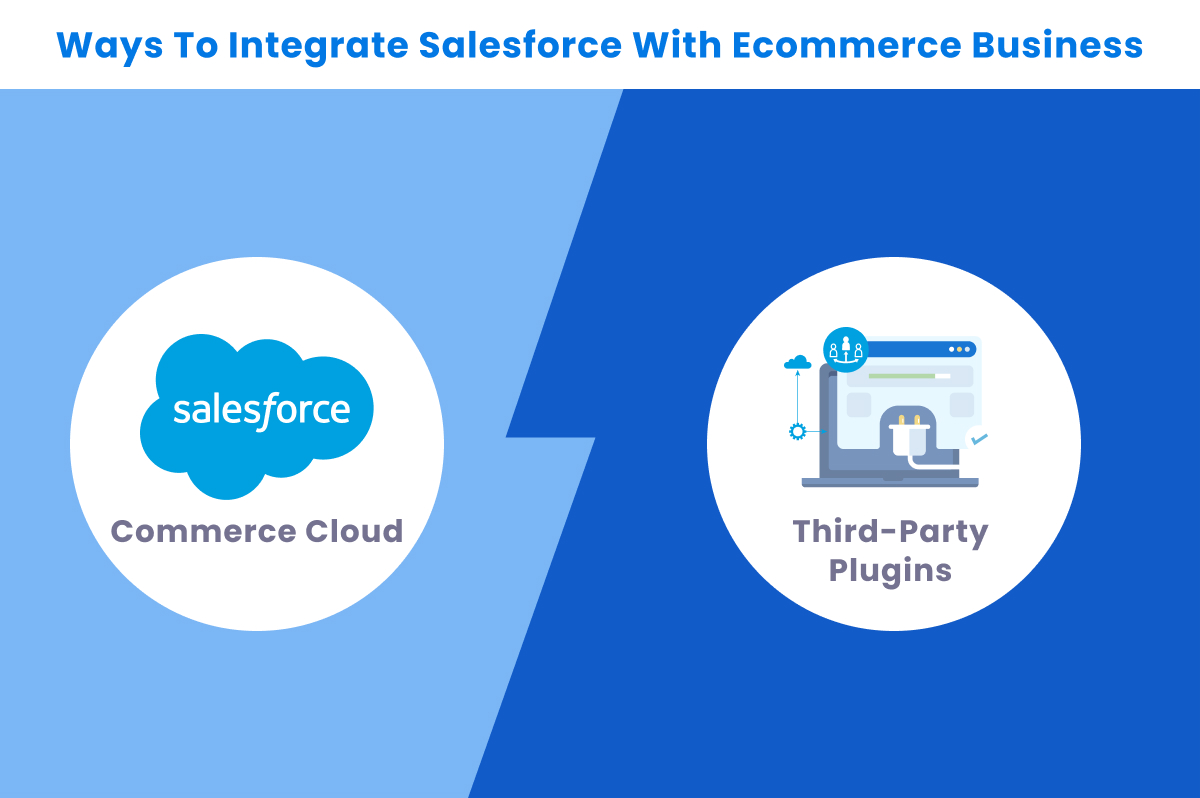Salesforce is a proven platform in the CRM industry. It wouldn’t be wrong to call it the leader. After all, it provides innovative solutions to companies to help them with customer engagement.
While many businesses can benefit from Salesforce features, it offers a unique service to all ecommerce businesses. With the dedicated Commerce Cloud, it offers end-to-end solutions for creating personalized and seamless shopping experiences.
This makes Salesforce ecommerce integration a crucial step for businesses looking to enhance their online presence and drive sales.
With Salesforce Commerce Cloud migration, businesses can easily integrate their existing ecommerce platforms with its robust CRM features. Now, before we move on to understanding how to do Salesforce ecommerce integration, let’s talk about Commerce Cloud.
What Is Commerce Cloud in Salesforce?
Commerce Cloud is a comprehensive solution for every other business need. After all, a successful business cycle works from awareness to engagement to consideration.
Salesforce Commerce Cloud consultants serve at all these stages. Relevant product listings raise brand awareness. On the other hand, a personalized shopping journey then ensures conversions and customer retention.
For this purpose, this cloud provides tools and features that enable retailers to manage their ecommerce operations efficiently, from product merchandising and inventory management to order fulfillment and customer service.
Businesses can reach their customers easily using multiple digital channels, which is only possible through Salesforce Commerce Cloud optimization. These channels include online marketplaces, social media platforms, and mobile apps.
Moreover, collaborating with leading Salesforce Commerce Cloud support service providers can help businesses optimize their ecommerce operations.
Besides, the platform’s result-oriented properties continue on this. It also supports the integration with other products. This way, businesses centralize customer data and insights for more informed decision-making.
What Is Salesforce Integration?
Salesforce integration connects different parts of a business into a cohesive whole. It’s like bridging the gap between various systems, applications, and data sources to create a unified ecosystem within the platform.
Through integration services, organizations synchronize critical data across departments. The purpose is to perform smoother communication and collaboration.
Whether it’s about integrating customer relationship management (CRM) tools, financial systems, or marketing automation software, the goal is identical. That is to break down silos and unlock actionable insights.
Remember, a world where sales, marketing, and customer service teams exchange ideas leads to many benefits, like more informed decision-making and enhanced customer experiences.
On top of that, Salesforce integration is not a one-time endeavor but a continuous optimization process, especially when businesses and technology grow.
What Is Salesforce Ecommerce Integration?
It is the process of merging online retail platforms with the strong abilities of the platform’s ecosystem. Ecommerce Salesforce integration provides a unified experience for businesses and customers to fulfill multiple goals.
The effortless flow of transactions, customer data, and insights between the ecommerce platform and Salesforce is what they are famous for.
The best part is that this integration eliminates the need for manual data entry, streamlining operations and reducing the risk of errors.
Moreover, by centralizing customer information, businesses get a comprehensive view of their buyers’ preferences and behaviors. Exactly what helps generate more targeted marketing efforts and personalized experiences.
Additionally, Salesforce ecommerce integration extends beyond just transactional data. It encompasses marketing automation, customer service, and analytics. As a result, businesses drive engagement, loyalty, and revenue growth across the entire customer journey.
In essence, Salesforce ecommerce integration is about breaking down barriers between online retail and customer relationship management. Thereby fostering synergy and unlocking new opportunities for businesses to thrive in the digital age.
Ways to Integrate Salesforce With Ecommerce Business
Inducing this CRM with your ecommerce business opens up a world of opportunities. Here are some effective ways to achieve an error-free Salesforce ecommerce integration:
Third-Party Plugins
Ecommerce integration with Salesforce via third-party plugins authorizes businesses to expand the functionality of their ecommerce platform. Businesses, irrespective of their sizes, can have various needs.
This integration of popular payment gateways, shipping carriers, or marketing automation tools offers flexibility and customization options to meet specific business needs.
Salesforce Commerce Cloud
Using the power of Salesforce Commerce Cloud implementation provides a robust solution for ecommerce businesses, particularly for those seeking comprehensive integration with this CRM.
With Commerce Cloud, businesses can seamlessly sync product catalogs, inventory, and customer data between their ecommerce platform and this CRM. All that forms a unified view of customer interactions and transactions across channels.
By implementing these integration methods, businesses can use the power of this platform to optimize their ecommerce operations effectively.
Which Ecommerce Integration Is Best for You?
Are you confused about which Salesforce ecommerce integration to opt for? You are not alone! Several online businesses often pass through the same phase of confusion.
However, there is no single or straightforward answer to this query. It all depends on multiple factors regarding your specific business needs. For instance, scalability requirements, compatibility with existing systems, customization options, and level of support required.
Third-party plugins offer flexibility and customization options to integrate with various systems and expand functionality. On the other hand, Commerce Cloud provides an in-depth combination of ecommerce platforms and CRM.
Remember that considering your business requirements, budget, and long-term goals is the key to a mindful decision. They help you determine which integration option aligns best with your objectives.
Conclusion
The successful implementation of Salesforce ecommerce integration represents a strategic culmination. It increases the realization of a unified vision where disparate data streams converge into actionable insights.
By leveraging this flow of information, businesses unlock a wealth of opportunities to elevate customer experiences, empower sales teams, and optimize operational efficiency, including through solutions like IVR API Integration.
Whether achieved through the agile deployment of third-party connectors or the comprehensive Salesforce Commerce Cloud development, the benefits resonate across the organization.
After all, it is not the technical proficiency of the integration that determines its success but the impact it has on the organization as a whole.
FAQs
How Does Salesforce Integrate With Ecommerce?
There are two Salesforce ecommerce integration ways. Third-party plugin and Commerce Cloud.
Does Salesforce Support Ecommerce?
Yes, it offers robust ecommerce solutions through its Commerce Cloud platform. This platform caters to B2B and B2C businesses, supporting diverse sales models and customer needs.
Can We Create an Ecommerce Website Using Salesforce?
While Commerce Cloud provides various website functionalities, it’s not solely a builder. It works best alongside custom website development or pre-built solutions on compatible platforms.
What Is the Salesforce Commerce Platform?
Commerce Cloud is a cloud-based SaaS platform for managing B2B and B2C ecommerce operations. It offers product management, order processing, marketing automation, and customer service features.
What Ecommerce Platform Did Salesforce Buy?
In 2016, Salesforce acquired Demandware, a leading cloud-based ecommerce platform. This acquisition formed the foundation of Commerce Cloud, significantly expanding its ecommerce capabilities.

Hasan Mustafa
Engineering Manager Salesforce at Folio3
Hasan Mustafa delivers tailored Salesforce solutions to meet clients' specific requirements, overseeing the implementation of scenarios aligned with their needs. He leads a team of Salesforce Administrators and Developers, manages pre-sales activities, and spearheads an internal academy focused on educating and mentoring newcomers in understanding the Salesforce ecosystem and guiding them on their professional journey.

